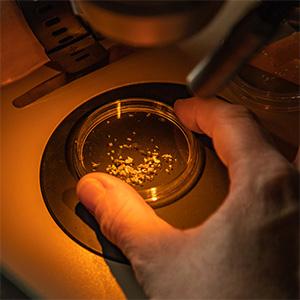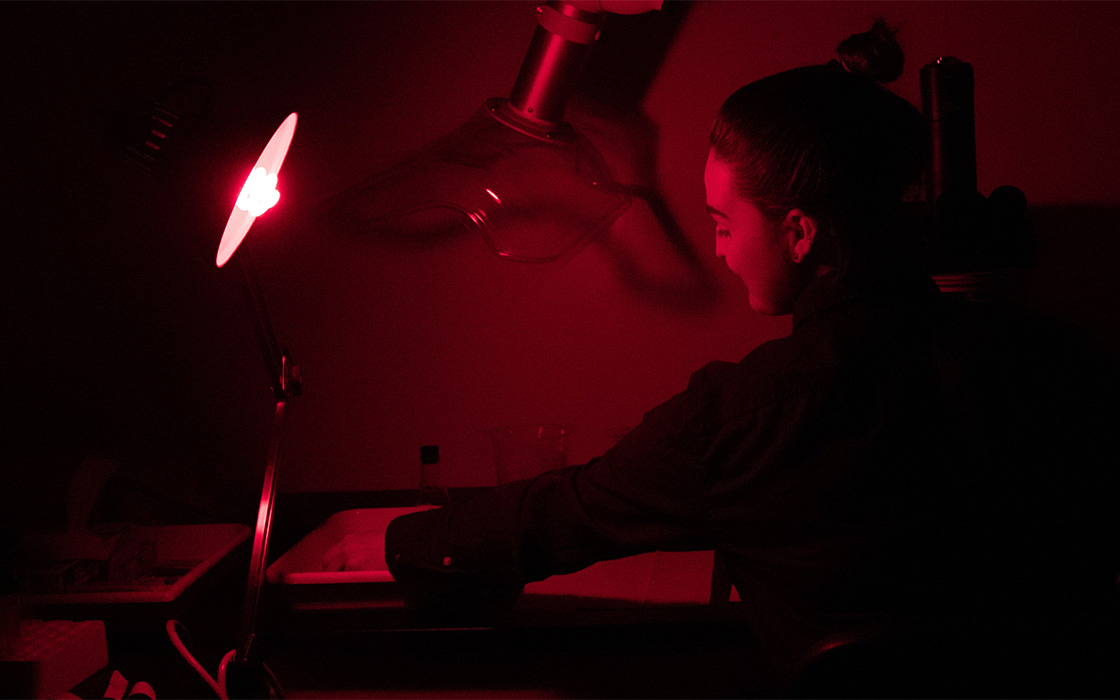
How They Spent Their Summer
A group of UW Tacoma students and one recent alumna spent their summer in the lab as part of Senior Lecturer Julie Masura's environmental research experience course.
Pictured above: UW Tacoma student Caitlyn McFarland using an epi-fluorescent research microscope. The microscope causes an organism to fluoresce or glow brightly under a mercury-vapor light which allows for ease of identification of the cell compared to the material not dyed with stain.
A group of seven UW Tacoma scholars spent a large part of their summer indoors. They were part of Senior Lecturer Julie Masura’s environmental research experience course. “This is the first time we’ve done something like this,” said Masura.
Participants in the eight-week course processed sediment samples from Puget Sound that were collected by different organizations including the King County and the Washington State Department of Ecology. The work took place both on campus in the limnology (study of lakes) and oceanography lab and at the Center for Urban Waters. “This was a great opportunity to provide students with experience doing sediment analysis in a professional setting,” said Masura.
All of the research assistants are either environmental studies or environmental science majors. The five who are current students received capstone credit for their work. One environmental science student and recent grad volunteered to be teaching assistants and lead the research. Another who is a graduate student in Marine Affairs on the UW Seattle campus volunteer to gain laboratory experience. “They really busted their butts,” said Masura. Students presented their findings at the Summer Undergraduate Research Symposium at the Center for Urban Waters. Their work will be incorporated into articles that will appear in scholarly journals.
Each one of the seven has their own reasons for taking part in the summer research experience. The stories of why they decided to pursue a career in science are as varied as are their biographies. I spoke with each of them during a freewheeling – and, at times, raucous – group conversation which has been edited for length and clarity.
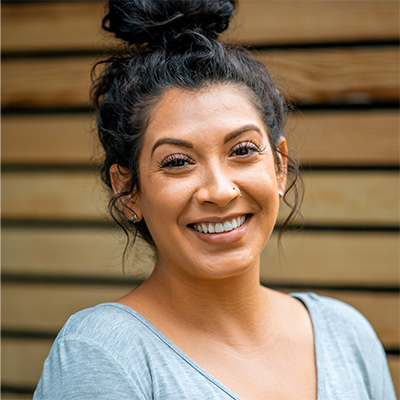
MaggieJo Baer
Senior/Environmental Science
“I’m working on looking at sediment samples for each year to get an idea of what’s going on with microplastics in Puget Sound bed sediments.”
“I’m applying to an oceanography graduate program and I eventually want to do research.”
“When I first went to college in 2010, after I graduated high school, I actually went for music.”
“I didn’t really have a big interest in science back then but I’ve always been interested in the environment and environmental issues. Now I love science especially chemistry and biology.”
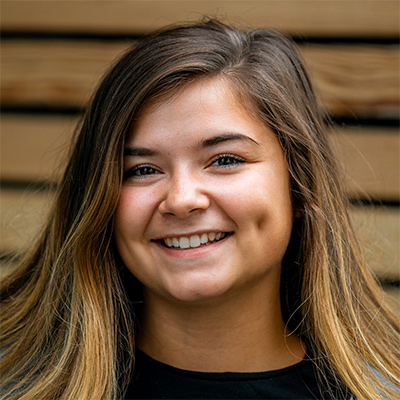
Abby Deaton
Environmental Studies ‘19
“I’m just kind of doing it [this class] for the experience, also I just like helping out.”
“She [Julie Masura] has definitely become a mentor to me. I took my first class at UW Tacoma in oceanography with her and it really sparked my interest.”
“Basically, we’re cleaning the samples, separating all the pieces using this cool thing called a sonicator. It basically shoots sound into the sample and breaks up all the pieces. To some people this work may sound boring but I’m kind of a big nerd and I think it’s pretty fun.”

Daniel Dyer
Senior/Environmental Studies
“I’m doing particle size analysis which has a lot of applications for construction and environmental purposes.”
“Basically, I mix mud into a solution of water and send it through a very expensive machine. I then take this data and input it into an Excel spreadsheet so we have a record of the different materials and locations where they were collected.”
“I hope to work for the Department of Ecology or the Department of Health. I love environmental restoration programs.”
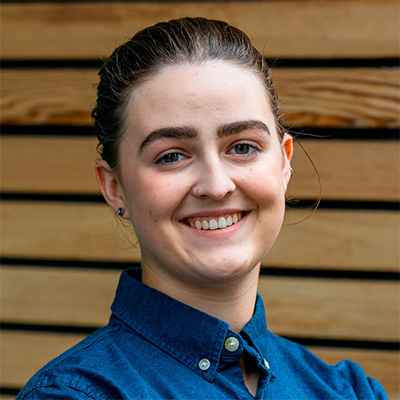
Caitlyn McFarland
Senior/Environmental Science
“I’m looking at a specific type of algae during its dormant stage. It creates toxic shellfish poisoning which impacts different sea life including clams and mussels.”
“My mom was a nurse and my dad worked with airplanes, so I was always interested in finding out how things work and being outside.”
“I was set on doing occupational therapy but the more I thought about it, the more I was like, ‘This is really cool but it’s not quite the science that I want to do.’”
“I really love water. It’s one of those things that always made my soul rumble.”

Cormesha Passmore
Senior/Environmental Studies
“I kind of struggled during my first few years in college. I eventually left and took a break for a little bit. I had my son and after that I was just like, ‘I want to go back to school.’”
“I really enjoy science. I like procedure, I like following instructions. I want to become a science teacher.”
“I’m a first-generation college student. It was hard at first but I’m going to use my experience to help my son when he is deciding if he wants to go to school.”
“This class, in particular, has given me a lot of tools I need to be successful.”
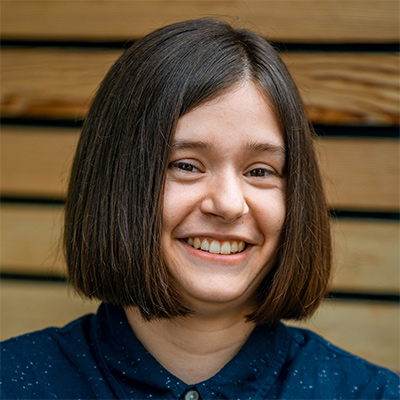
Mara Valdez
Junior/Environmental Science
“I’m looking at the percent of organic matter in the sediment. I look at the sample before it’s been processed and then again after it’s gone through a cycle. The final part is seeing how much percent carbon is in each sample.”
“I enjoy environmental science but I’m minoring in geographic information systems (GIS) so, right now, I’m interested in working with the Department of Ecology on anything related to GIS.”
“This internship has helped me get experience in the lab.”
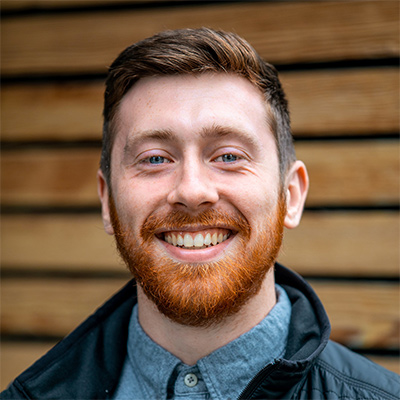
Stone Ward
Senior/Environmental Studies
“I’m working on microplastics. We take raw samples and do a series of different processes to eliminate all the silts and clays and then eliminate the organic content and in the end you have the plastic itself.”
“I knew that I liked science more. I’d rather talk about math and science than feelings.”
“I graduate in December. My long-term goal is to fly planes either in the military or for a commercial airline.”
Main Content
Mud, Bugs and...Plastic
Senior Lecturer Julie Masura connects her love of teaching and her passions for geology and the health of Puget Sound.
